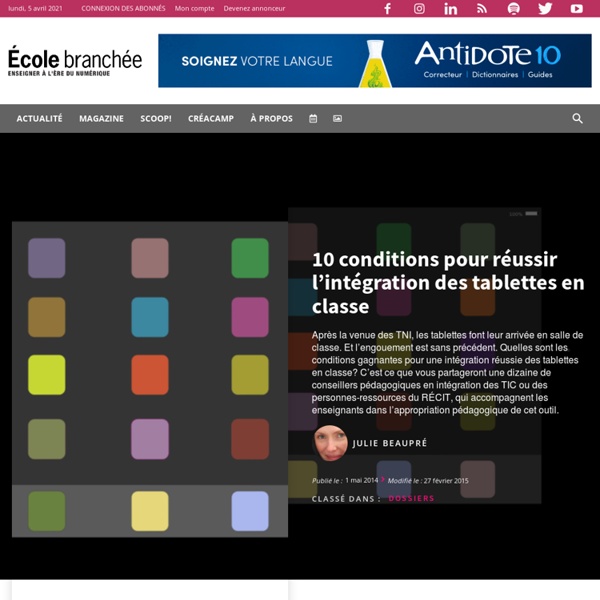



http://www.ecolebranchee.com/2014/05/01/dossier-tablettes/
Related: EduNumérique • Intégration et appropriation des TICE • Tablettes et outils mobiles • julirompreCrafting a successful BYOD policy By Michael Shoaf and Dianna R. Foley Read more by Contributor October 15th, 2013 The school district purchased technology equipment that can be used daily and/or checked out for extended periods of time by students. District leadership also knows and appreciates that students own, and often prefer to use, personal computers and devices for their educational experience. The Rocky River Schools embraced this notion and developed a plan, including a policy, to welcome student technology into the schools as a complement to existing district resources. Thus the BYOD initiative commenced.
The 4 Stages Of Edtech Disruption The 4 Stages Of The Integration Of Technology In Learning by Terry Heick For professional development around this idea or others you read about on TeachThought, contact us. Technology can be used in the learning process in a variety of ways. Why Technology Has Failed To Revolutionise Education - Total Education This Will Revolutionize Education is a video by Veritasium that has recently gone viral. Veritasium – a science video blog – produces ‘experiments, expert videos, cool demos, and discussions with the public about everything science.’ This particular video (which is below) features Derek Muller who explains that, despite constant claims that disruptive technologies are set to revolutionise education, we haven’t actually seen any digital education revolution since before the times of Thomas Edison. Rather, what we have seen is a gradual evolution.
Educational App or Digital Candy? Helping Parents Choose Quality Apps for Kids - Association for Psychological Science News There are now over 80,000 apps marketed as “educational” in the Apple app store, the majority of which are targeted towards children and even babies. Parents are led to believe that these apps provide real learning opportunities for their children, but scientific research suggests that many of the apps are nothing more than digital candy. “Many apps marketed as ‘educational’ are basically the equivalent of sugary foods,” says Kathy Hirsh-Pasek of Temple University, co-author on a new report investigating educational apps. “At best, most of these apps will do no harm; at worst, they add even more distraction to children’s deeply distracting lives.”
edutopia Imagine a world where resources were limited to what was found in the classroom or the school closet known as the "Curriculum Materials Room." Picture a world where students wrote letters with pen and paper to communicate with other students and adults outside of the building. Due to postage costs, the teacher either sent the letters in bulk or paid for stamps out of his or her own pocket. Internet Searches May Make You Think You’re Smarter Than You Are Using the Internet is an easy way to feel omniscient. Enter a search term and the answers appear before your eyes. But at any moment you’re also just a few taps away from becoming an insufferable know-it-all. Searching for answers online gives people an inflated sense of their own knowledge, according to a study.
A Timeline of Google Classroom’s March to Replace Learning Management Systems Over the last two years, Google has taken its popular applications and outfitted them for the classroom. While many schools and districts continue to use existing learning management systems, such as Blackboard, Canvas, Moodle and Schoology, Google’s Classroom platform is increasingly catching teachers’ eyes. Many schools already use Google’s suite of productivity tools — Docs, Sheets and Slides. What Classroom aims to provide is a way to package these apps together and add features unique to what teachers and students need. In short, Classroom wants to be a lightweight learning management system. 8 teacher guides for free tech tools (including Facebook, Twitter and Pinterest) I am a fan of free educational technology for teachers. This is why I created the following 8 teacher’s guides to free educational technology. The aim is to offer teachers some of the best tips concerning the most popular educational resources available today.